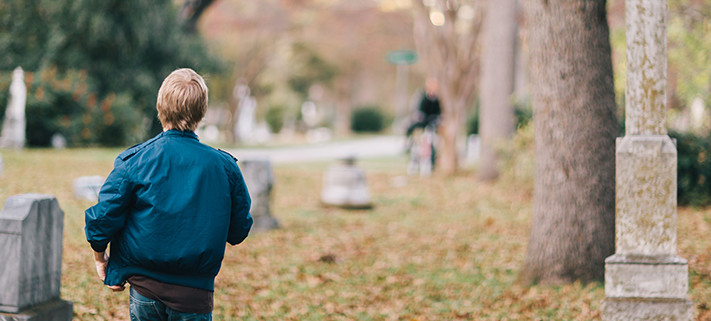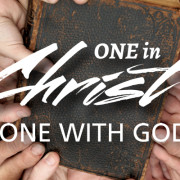Moments of reflection
Working in a cemetery brought time to think about death, life, friends, and the cross of Jesus.
James A. Mattek
It was a pretty typical day in the cemetery . . . until she wouldn’t leave. So, we just waited and watched from a distance.
I was the teenage caretaker for the church cemetery . . . not a bad job for someone paying his own way through a Lutheran high school. With a hand shovel, I had dug the grave the day before. Those I stood with were from the vault company that had lowered the open cement vault into the hole, covered the pile of dirt I created with green carpet that was intended to resemble grass, and then set the device in place that would lower the casket into the vault once the mourners had left.
But one stayed. From a distance she appeared to be in her 40s. I could see her wipe her eyes. She was having a hard time. At first the vault crew looked at their watches in irritation; they wanted to get this over with and go home. Then, with me, they just watched in silence. There’s something about death that makes most people stop and think. “Teach us to number our days, that we may gain a heart of wisdom” (Psalm 90:12).
Finally, she placed her hand on top of the casket and then slowly made her way to her car and was gone. I walked to where she had stood for so long. The name of the deceased and her birth year were already etched on the stone. She had died young—I guessed she was about as old as the woman who had just said her good-bye. Was she a good friend, a high school classmate, a cousin, a sister? Death severs bonds with a cruel dull knife. “Lord, if you had been here, my brother would not have died” (John 11:32).
As I stood there, the crew backed the truck up. After lowering the casket, they would cover it with the cement lid. Then they could pack up and finally go home. That’s when my work would begin, shoveling the dirt back into the hole.
In the years that followed, it dawned on me that I had witnessed things about death that most people don’t. As dignified, respectful, and sterile as we attempt to make death appear, there is still something rather ugly about it. Those bodies were once warm and alive with hopes and dreams, work and play, family and friends. Then it all stopped, and they were put in the cold earth. “The living know that they will die” (Ecclesiastes 9:5).
As the casket slowly descended, I noticed it. The casket had a decorative cross on its cover. That was the very place where the woman had laid her hand. It’s been 44 years, but I can see that cross like it was yesterday. The message of the cross and what occurred on the third day changes so many things . . . about death, life, and cemeteries. “Death has been swallowed up in victory” (1 Corinthians 15:54).
I recall that the tedium of my job at the cemetery began to change too. I began to notice things that I had missed and to appreciate things I had taken for granted. As I drove the Ariens rider for countless hours between the gravestones, I started to notice names and do the math. Some had lived long lives, others only months or days. Some died as teenagers, which really hit me and made me think. Maybe I wasn’t as indestructible as my young mind imagined. What if that happened to me? Was I ready? Good Friday and Easter had been important to me for as long as I could remember. The events of those days now took on additional meaning—and the setting was a church cemetery on hot summer afternoons. It’s amazing how our Lord inspires introspection and budding spiritual maturity in the oddest places. “For dust you are and to dust you will return” (Genesis 3:19).
My mind-numbing job gave me time to think. As I rode along on the mower, I recall thinking about my mother who led evening devotions for the family while my father was in meetings at church. There were the Sunday worship experiences. I remembered the names of the fine Christian teachers I had in the Lutheran grade schools I attended and the high school I was enrolled in. The importance of things spiritual began to click—the hymns I sang; the Scripture verses I memorized; the Bible stories I learned and relearned; and the Christian example of my teachers, some who I now realize helped me more than they know. “Always give yourselves fully to the work of the Lord, because you know that your labor in the Lord is not in vain” (1 Corinthians 15:58).
I remember a few gravestones in particular. I asked an old-timer from the cemetery board about the woman who died young. On her stone was the word baby. “She was a good church-going woman,” he said. “She died in childbirth, and the baby died a bit later. The pastor got there in time to baptize him. In the casket the baby was in her arms.” The events of Good Friday and Easter—a mother forgiven through the shed blood of God’s Son, and a baby washed in the spiritually medicinal water of Baptism. Together their souls entered glory to enjoy the embrace of their Father. I cut the grass around their stone with extra care and contemplation. “Whoever lives by believing in me will never die” (John 11:26).
Today, when I get back to the area, I try to visit the cemetery and take a stroll. I’ve noticed the names of three friends from my grade school days. We played football together at recess. I want to believe that they remembered the Bible stories we were taught . . . stories about Job and others. “I know that my redeemer lives, and that in the end he will stand on the earth” (Job 19:25).
Word has filtered back to me that a number of my high school classmates have already been taken by car crash, farm accident, even congenital disease. We had sat together in religion classes for four years. Did they hold on to what they were taught and believed? I want to think so.
After a recent visit, I made one last stop at the place where she had stood for so long. I could still see the cross in my mind’s eye . . . where she had laid her hand. Then I looked out over the cemetery and tried to imagine what it will be like. No, not what it will be like to lie in my grave, but what will this place look like when our Savior returns and calls the dead back to life? What a sight!
“After my skin has been destroyed, yet in my flesh I will see God; I myself will see him with my own eyes. . . . How my heart yearns within me!” (Job 19:26,27).
James Mattek, director of ministry at WLCFS-Christian Family Solutions, Germantown, Wisconsin, is a member at Trinity, Watertown, Wisconsin.
SUBMIT YOUR STORY
Do you have a manuscript, idea, or story from your own life you’d like to share for use in Forward in Christ or on wels.net? Use our online form to share it to our editorial office for consideration.
SUBSCRIBE TO FORWARD IN CHRIST
Get inspirational stories, spiritual help, and synod news from Forward in Christ every month. Print and digital subscriptions are available from Northwestern Publishing House.
Author: James A. Mattek
Volume 103, Number 4
Issue: April 2016
Copyrighted by WELS Forward in Christ © 2021
Forward in Christ grants permission for any original article (not a reprint) to be printed for use in a WELS church, school, or organization, provided that it is distributed free and indicate Forward in Christ as the source. Images may not be reproduced except in the context of its article. Contact us




